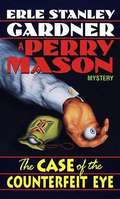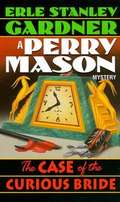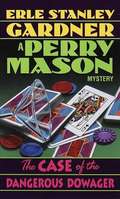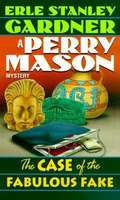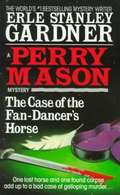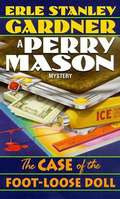- Table View
- List View
The Case of the Careless Kitten
by Erle Stanley GardnerWhen a key witness in a forgery case goes missing, the police come down on Mason, who now has two clients to defend against serious criminal charges: Gerald Shore--and his own secretary, Della Street!
The Case of the Careless Kitten: A Perry Mason Mystery (A\perry Mason Mystery Ser. #0)
by Erle Stanley GardnerPerry Mason seeks the link between a poisoned kitten, a murdered man, and a mysterious voice from the past Helen Kendal's woes begin when she receives a phone call from her vanished uncle Franklin, long presumed dead, who urges her to make contact with criminal defense attorney Perry Mason; soon after, she finds herself the main suspect in the murder of an unfamiliar man. Her kitten has just survived a poisoning attempt, as has her aunt Matilda, the woman who always maintained that Franklin was alive in spite of his disappearance. Lucky that Helen took her uncle's advice and contacted Perry Mason—he immediately takes her as a client. But while it’s clear that all the occurrences are connected, and that their connection will prove her innocence, the links in the case are too obscure to be recognized even by the attorney’s brilliantly deductive mind. Risking disbarment for his unorthodox methods, he endeavors to outwit the police and solve the puzzle himself, enlisting the help of his secretary Della Street, his private eye Paul Drake, and the unlikely but invaluable aid of a careless but very clever kitten in the process. Reprinted for the first time in over twenty years, The Case of the Careless Kitten is one of the most highly praised cases in the iconic Perry Mason series, which need not be read in any particular order.
The Case of the Caretaker's Cat
by Erle Stanley GardnerTHE CASE OF THE CARETAKER'S CAT was the seventh Perry Mason mystery that Erle Stanley Gardener wrote. Our story opens as Charles Ashton seeks the advice of Perry Mason. His previous employer, Peter Laxter, now deceased, left a provision in his will that Ashton, a faithful caretaker, would always have a job with his heirs. But one of the heirs, the nasty Samuel C. Laxter, has decided that Ashton's cat must go. Poor old Clinkers the cat must leave or Samuel Laxter threatens to poison him. Perry takes the case, probably out of sheer boredom. He's just finished a murder trial, and there's nothing interesting on his desk. But before you know it, Ashton is dead; strangled. And then old Peter Laxter's nurse turns up dead, too. Maybe Peter Laxter's death wasn't an accident, either! And just who is getting blamed for all these deaths? Young Douglas Keene, the fiance of beautiful young Winifred Laxter, the only Laxter heir that DIDN'T inherit under the strange will. Up steps Perry Mason to defend the innocent young man. And so he does in his usual flamboyant style. Perry appears along with Della Street, his faithful secretary. and Paul Drake, his detective friend. District Attorney Hamilton Burger shows up just long enough to speak a paragraph's worth of dialog. But what a paragraph it is!
The Case of the Cautious Coquette
by Erle Stanley GardnerAt the behest of Perry Mason, who is representing a young man hit by a car, Paul Drake places an ad in the paper asking for witnesses to the hit and run. To Mason's astonishment, two different drivers are identified, one by a mysterious letter enclosing a key.
The Case of the Counterfeit Eye
by Erle Stanley GardnerWhen Peter Brunold shows up at Perry Mason's office, claiming one of his glass eyes has been stolen and a counterfeit substituted in its place, who could guess that it would lead to murder? But before you know it, the real authentic glass eye is found. Found in the hand of a dead man. And Brunold has an excellent motive for wanting him dead! He's in love with the dead man's wife. Was it suicide? Well, a gun is found on the floor of the room. But then a second gun is found under a blanket. Wait! There's a third gun in the dead man's shoulder holster. What's with all the guns? And that typed suicide note is starting to look suspicious. Yup, it's gotta be murder. And Peter Brunold is the one that all the evidence is pointing to. Can Perry Mason prove his innocence and at the same time point the finger at the guilty party? And can he do it, all the while confounding the new D.A.? You betcha! But why did he just go out and order six custom-made glass eyes?
The Case of the Crooked Candle
by Erle Stanley GardnerA key element in a complicated story of a body found on a beached boat is acandle that stands at a steep angle. "The details of the boat grounded at low tide with a corpse in the cabin are superbly handled, and the rest of the story--motives and characters--is both believable and reasonably straightforward.... (It) is an absolutely first-rate job."
The Case of the Crying Swallow
by Erle Stanley GardnerThe `Publisher's Note' says this was published after Erle Stanley Gardner's death in 1970. It contains a Perry Mason novelette and three short stories. Two predate the Perry Mason series. Contains THE CASE OF THE CRYING SWALLOW THE CANDY KID THE VANISHING CORPSE THE AFFAIR OF THE RELUCTANT WITNESS
The Case of the Curious Bride
by Erle Stanley GardnerAt all starts when Rhoda Montaine visits Perry Mason's office, seeking legal advice for "a friend." Perry's no dummy. He knows what she's up to. Seven years ago, she was married to Gregory Moxley, a con man and rotter of the worst sort. He disappeared and she's ready to have him declared legally dead. She's just recently married wealthy Carl W. Montaine, and is now horrified to find that her first husband, Gregory Moxley, is still alive. Not only that, but he's seeking blackmail money to keep quiet and out of sight. It seems like a setup for murder and that's just what happens. Rhoda's supposed to sneak out of the house at 2 AM to meet with Moxley and pay him off. She shows up at his apartment a few minutes late, and is right in the middle of his murder. It's an open-and-shut case; she evens admits she hit him with the fireplace poker. Will Perry Mason be able to solve the crime?
The Case of the Dangerous Dowager
by Erle Stanley GardnerWhen Matilda Benson solicits the help of Perry Mason, her request seems simple enough: cruise to a gambling ship moored just beyond the twelve-mile limit and buy back the IOU's signed by Miss Benson's niece. But after Mason reaches the floating casino, he discovers problems aplenty--most notably the ship's owner with a bullet hole through his head. Strangely enough, Matilda and her niece are also on board that night...when someone tosses a gun over the railing. Does Perry Mason's client have something to hide? With the support of his trusty secretary, Della Street, and the ever-helpful Paul Drake, Mason dives into an ocean of menace.
The Case of the Daring Decoy
by Erle Stanley GardnerPerry Mason defends a man embroiled in a stock battle who is accused of killing a business rival's secretary. Was the woman in a nightgown with a mudpack on her face trying to keep the gun herself, or palm it off?
The Case of the Daring Divorcee
by Erle Stanley GardnerWhen a man is shot, his second and third wives each claim to be his legal widow and heir to his millions. Perry Mason triumphs in another dramatic court appearance.
The Case of the Demure Defendant
by Erle Stanley GardnerA woman confesses to murder during a therapy session, and her doctor consults Perry Mason as to the legal ramifications. Later Perry Mason defends the woman in court.
The Case of the Drowning Duck
by Erle Stanley GardnerPerry Mason and Della Street are on a vacation in Palm Springs when a wealthy businessman asks for advice about his daughter's boyfriend, a chemist who drowns ducks and becomes a murder suspect.
The Case of the Drowsy Mosquito
by Erle Stanley GardnerA wealthy prospector is camping in his own back yard, someone tries to poison Perry and Della, Paul Drake poses as a drunken prospector, and the clue to the murder is the sound of a mosquito flying in lazy circles.
The Case of the Dubious Bridegroom
by Erle Stanley GardnerFirst Perry Mason gets his face slapped by a beautiful burglar in his office building, then a Tijuana wedding trip leads to a murder.
The Case of the Dubious Bridegroom (The Perry Mason Mysteries #3)
by Erle Stanley GardnerA lawyer is sucked into a couple&’s hostile divorce in this mystery with &“a stellar ending&” from the original detective series that inspired the HBO show (Kirkus Reviews). Edward Garvin is a very successful businessman with a very unhappy ex-wife—who wants his money. So Garvin calls on lawyer Perry Mason to protect his company from her schemes, and ensure the divorce they&’d gotten in Mexico is actually finalized. But when Garvin&’s former spouse is struck down by a killer, Mason&’s client becomes the chief suspect. Fortunately, the attorney &“comes up with dazzling answers&” to the mystery . . . (The New York Times). This whodunit is part of Edgar Award–winning author Erle Stanley Gardner&’s classic, long-running Perry Mason series, which has sold three hundred million copies and serves as the inspiration for the HBO show starring Matthew Rhys and Tatiana Maslany. DON&’T MISS THE NEW HBO ORIGINAL SERIES PERRY MASON, BASED ON CHARACTERS FROM ERLE STANLEY GARDNER&’S NOVELS, STARRING EMMY AWARD WINNER MATTHEW RHYS
The Case of the Empty Tin
by Erle Stanley GardnerA misplaced tin can in a household with a mother, a father, three children, an aunt, and a boarder is not very unusual. But when the tin contains a coded message, and a trail of blood leads from a neighbors' house, the family and the neighbors can barely wait for the arrival of Perry Mason, Della Street, and Paul Drake to solve the mystery.
The Case of the Fabulous Fake
by Erle Stanley GardnerSILENCE IS MURDER Perry Mason's beautiful new client isn't giving anything away, not even her name, and he suspects that what she does choose to reveal is mostly lies. Certainly the bag full of cash she carries isn't shopping money. All the mystery woman asks is that Mason make himself available for a few days in case she needs him--for what purpose, she remains silent as the grave. In fact, his headstrong client, who identifies herself only as "36-24-36," is headed for disaster--not only into a blackmailer's clutches but into a lethal trap from which not even Perry Mason's brilliant courtroom sorcery may be able to extricate her. Alive, anyway . . . THE ORIGINAL COURTROOM NOVELS
The Case of the Fan-dancer's Horse
by Erle Stanley GardnerIt all begins with the fan-dancer's "costume" - what there is of it.
The Case of the Fiery Fingers
by Erle Stanley GardnerPerry Mason defends a woman twice--once on theft charges, and then on murder charges.
The Case of the Foot-Loose Doll
by Erle Stanley GardnerPerry Mason lives on in the perennially popular courtroom classics that put legal thrillers on the map. Case closed!
The Case of the Fugitive Nurse
by Erle Stanley GardnerWhen young Steffanie Malden, recently widowed by the death of her husband, the very successful surgeon Summerfield Malden, consults Perry Mason, she wants the $100,000 her husband and nurse hid from his wife and the IRS in a love nest, but changes priorities when the authorities prosecute her for murder.
The Case of the Gilded Lily (The Perry Mason Mysteries #6)
by Erle Stanley GardnerA crime thriller starring the sleuthing lawyer portrayed in the HBO limited series—from the Edgar Award–winning &“kingpin among the mystery writers&” (The New York Times). Stewart Bedford is willing to cooperate with a blackmailer to protect his beloved wife. But when he wakes up in a daze to find the man shot dead with Bedford&’s gun and his blond escort missing, he&’ll need some help from defense lawyer Perry Mason . . . This mystery is part of Edgar Award–winning author Erle Stanley Gardner&’s classic, long-running Perry Mason series, which has sold three hundred million copies and serves as the inspiration for the HBO show starring Matthew Rhys and Tatiana Maslany. DON&’T MISS THE NEW HBO ORIGINAL SERIES PERRY MASON, BASED ON CHARACTERS FROM ERLE STANLEY GARDNER&’S NOVELS, STARRING EMMY AWARD WINNER MATTHEW RHYS
The Case of the Glamorous Ghost
by Erle Stanley GardnerSome think they saw a ghost, but it is a real live woman with a taste for trouble and a talent getting out of it. Her half sister hires Perry Mason to investigate her latest escapade.


